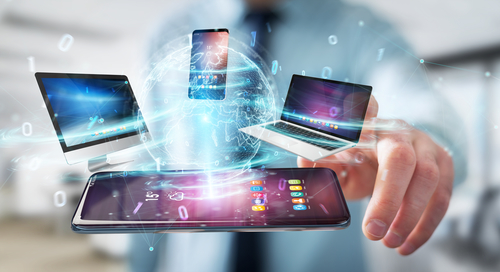Six trends in safe mobile working
The use of mobile end devices in companies moves in two areas of tension: On the one hand, between company-owned and private smartphones and tablets, on the other hand, between user-friendliness and security.

Inadequately protected mobile devices quickly prove to be a gateway for cyber attacks of all kinds. For this reason, companies have stepped up their efforts to improve the security situation in 2018 - not least due to the stringent requirements of the General Data Protection Regulation (GDPR). However, one of the major challenges remains to further increase both security and user-friendliness and thus the efficiency of mobile working with targeted measures (see also article "mobile shadow IT„).
Virtual Solution explains the important trends around secure and user-friendly enterprise use of smartphones and tablets:
- Business apps need to improve usability and security.
Corporate apps must be just as easy to use as their private counterparts, and security requirements must not restrict employees. Since the GDPR came into force, security has clearly taken precedence. In the future, however, ease of use will become more important again, but without compromising security. Business-critical data must be effectively protected against manipulation and loss. Taking both aspects into account at the same time is becoming a major challenge for app developers and corporate IT security managers. When selecting solutions, however, companies must ensure that security and usability are equally important.
- Data protection is coming more to the fore.
For a long time, the topic of data protection was considered to be "imposed from the outside" in companies. In the course of the discussion about the GDPR and at the latest since it came into force, a gradual change has taken place. Many have recognized the opportunity to make their security processes for protecting personal data in the data center and on mobile devices compliant with the law and, above all, more efficient. People's awareness has also changed. They think more often about the use of their own data, but also about how they handle data from customers or colleagues.
- Business departments are increasingly influencing the procurement of apps.
In general, departments are far more involved in the acquisition of new software today than they used to be - regardless of whether it's custom or standard software. While functionality is the primary consideration for this type of application, user-friendliness is a key selection criterion for apps for mobile devices. In addition, power users from the specialist departments often make representations to their superiors and the IT department with their own requests for new functions and apps for smartphones and tablets. The decision-making and purchasing body for software selection is expanding and new criteria are becoming important. It is not only the companies that have to adjust to this, but also the application providers.
- Biometric authentication continues to gain importance.
As employees use their smartphones to access more and more apps and enterprise applications - whether web-based or in the cloud - login and authentication are becoming increasingly important. The IT department must ensure that only authorized users have access. However, experts believe that the traditional password has had its day, as it is too error-prone. Alternative biometric methods such as fingerprints, facial recognition or iris scans will gain in importance. This is an issue that not only companies need to think about, but also app and application developers.
- The smartphone used at work is becoming a status symbol.
The latest smartphone has almost become more important than the fancy company car, once the most important status symbol in the professional world. No wonder employees in many places are frustrated by "old-fashioned" devices or restrictive device strategies. If employees can bring their own high-value devices, this promotes acceptance of a security solution and employee satisfaction. The prerequisite, however, is that a container solution is used on the devices that ensures strict separation of work and private apps and data.
- "Always on" is out.
Time for private things is important, which is why "cell phone fasting" - at least at certain times - is also an issue. Some companies have a restrictive policy. At VW, for example, employees covered by collective bargaining agreements sometimes receive no work-related e-mails between 6 p.m. and 6 a.m. and on weekends, and cannot send any. Other companies are less strict and offer employees more freedom. They can then decide for themselves whether or not they want to check and respond to e-mails on the weekend or in the morning on the subway. The trend toward increasing employees' personal responsibility will become more prevalent in the near future.
"Maintaining and, in many cases, further expanding the IT security of mobile devices are permanent tasks against the backdrop of trends in secure mobile working. Companies will have to take greater action here in the near future, coordinating a number of factors and deploying them in the appropriate combination in each case," explains Günter Junk, CEO of Virtual Solution AG in Munich. "Technical and organizational measures are indispensable for high security and the necessary data protection. But employees must also be convinced of this and do their part."
Source: Virtual Solution









